84% Adult Israeli Jews support religious freedom and equality of civic burden
2019 Israel Religion & State Index and post-election survey
84% Adult Israeli Jews support religious freedom and equality of civic burden; 74% oppose government’s activities in religion-state
63% want a civil coalition, which does not depend on the ultra-Orthodox parties and advances religious freedom and equality
64% support equal status for the non-Orthodox Jewish streams and Diaspora Jewish engagement in advancing religious freedom and equality in Israel
Wide support (62%-84%) for the principles of the Vision Statement on Israel as Jewish and democratic state.
26/09/2019 21:11
Tags: Hiddush polls · Israel Religion and State Index · marriage freedom · pluralism · coalition · government · religious freedom · equality
Today, Thursday, September 26, 2019, Hiddush released the 2019 Israel Religion & State Index. It is the eleventh report, which Hiddush has been publishing since its founding in 2009. It is the only one of its kind, a systematic, in-depth survey of the positions of the adult Jewish population in Israel on matters of religion and state. The report presents a comprehensive picture of all conflict topics in this arena, the break-down of the public positions according to religious and political outlooks, voting patterns, and additional relevant background data. Since the polling was conducted in August, Hiddush also held a complementary survey this week, intended to add updated data regarding post-election public positions.
The Index is relevant and important, not only for the Israeli public, having just gone through a contentious election campaign in which religion-state matters were at the center of public discourse, but for Diaspora Jewry (and American Jewry in particular).
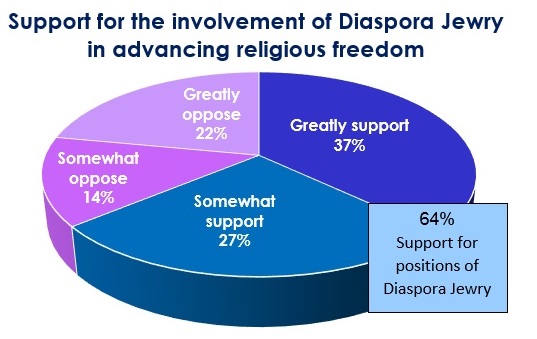
While different surveys and commentators pointed out the ambivalence of many in Israel regarding the extent to which the Israeli government should take into consideration the positions of Diaspora Jewry, when the question is focused on Diaspora Jewish leadership’s initiatives to increase its involvement in advancing religious freedom and equality in Israel – a consistent and unequivocal majority supports this. In the current Index, 64% expressed support in response to the question:
“There is a growing tension between the Israeli government and Diaspora Jewry because of the government’s position on issues such as ‘Who is a Jew?’, prayer at the Kotel, the right to marry, and the status of the non-Orthodox streams in Israel. Different organizations in Diaspora Jewry work to strengthen religious freedom and pluralism in Israel, such as: freedom of choice in marriage, ending the Chief Rabbinate’s monopoly over conversion, etc. What is your position on these activities?”
The extent of current support represents a significant rise since the 2017 Index when support was expressed by 55%. No less important is the fact that support is rendered by the majority of both the secular and traditional sectors, and that the support cuts across political boundaries from the ‘Democratic Camp’ (96%) and Blue-&-White (87%) to the Likud (54%).
Similarly, 64% of Israel’s adult Jewish population expressed support for granting equal status in Israel to the three major streams in Judaism – Orthodox, Conservative, and Reform. This majority has been consistent and stable since 2009 (63%) when Hiddush started surveying public opinion; it is shared by the voters of all non-ultra-Orthodox parties in the past government coalition, as well as 91% of Blue-&-White voters.
Among other findings of the Index survey, the following is revealed:
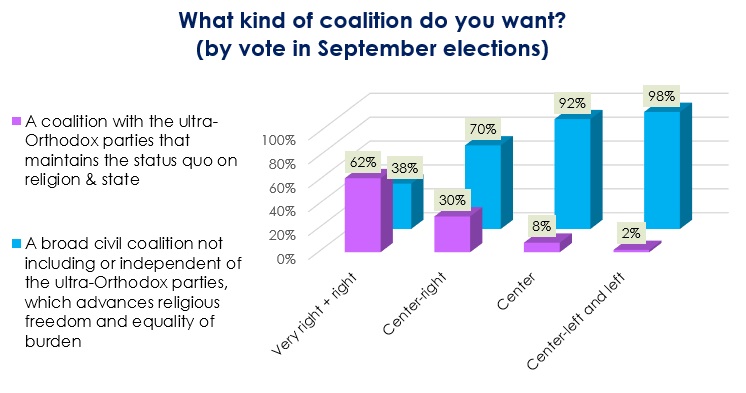
- 63% want to see a civil coalition formed, which is not dependent on or does not include the ultra-Orthodox parties, and which advances religious freedom and equality. Among Blue-&-White voters, 97% wish for this.
- 90% of Blue-&-White voters want their party to set issues of religious freedom & equality as a condition for joining the government coalition.
- 69% of the public responded that it is important for them that “the party for which they voted in the September 17th elections will fight in the Knesset and government (if it has joined it) to advance religious freedom and equality of civic burden, including issues like civil marriage and divorce, allowing public transport on Shabbat, IDF enlistment of yeshiva students, etc.” Among these were 95% of Blue-&-White voters, as well as 62% of Likud voters.
- The Index measured the public’s reactions to the principles outlined in the Vision Statement for Israel as Jewish and democratic state (http://rrfei.org/petitions/vision-israel-jewish-democratic-state/), a joint statement of leaders, rabbis, and activists, both from the Diaspora and from Israel, representing all religious streams and political outlooks. A large majority of approximately two-thirds expressed support for the variety of changes it calls for, such as ending the Chief Rabbinate’s monopoly and putting an end to granting governmental authority to any religious establishment; ending the coercive authority of rabbinical courts and religious courts in general and limiting them to a voluntary basis; equal recognition of conversion of all major streams of Judaism. A particular high level of support was enjoyed by the principle of equality in shouldering the military/civic burden and participation in the workforce (84%). Only 20% support the claim of the ultra-Orthodox parties that yeshiva should be exempted from IDF services because “the Torah is their craft.”
As to the order of priorities and relative importance of the different matters of dispute, Hiddush explored this through a number of surveys and through different ways of presenting the question, which led to the following conclusions:
- For the majority of the public, these are issues of importance. Only 25% responded that none of these issues controversial topics are important to them.
- The highest importance was attributed to the general principle of religious freedom and equality of shouldering the civic burden. Other respondents pointed to particular issues as most important to them. Top among these were: public transportation on Shabbat, recognition of civil marriage and divorce, drafting yeshiva students into IDF or civilian services, cutting public funding for yeshivas and religious institutions. Lower importance was attached to prohibiting the exclusion of women in the public sphere, enforcing core curricular studies in ultra-Orthodox education, and opening mini-markets and businesses on the Sabbath. The lowest level of importance was assigned to equality for the non-Orthodox streams and women’s prayer groups at the Kotel, reading aloud from the Torah (10% and 2% respectively). It should nevertheless be emphasized that when, over the years, Hiddush examined the level of support for all these issues, it was repeatedly established that a majority of the adult Jewish population, which supports all of them, including equal status for the Non-Orthodox streams and women’s prayer groups at the Kotel. The difference between the findings is that at this time, we measured the order of priorities, and the relative degree of importance that the public attaches to each of these issues. For a detailed break-down table, click here.
The Index provides validation to Hiddush’s assessment of recent years that the positions that political parties take and the degree to which they commit themselves to advancing religious freedom and equality plays a significant role in the voters’ decisions to support these parties. In the complementary survey conducted this week, 66% responded that this made a significant impact in their decisions for whom to vote. This was the response given, for instance, by 83% of Blue-&-White voters in September.
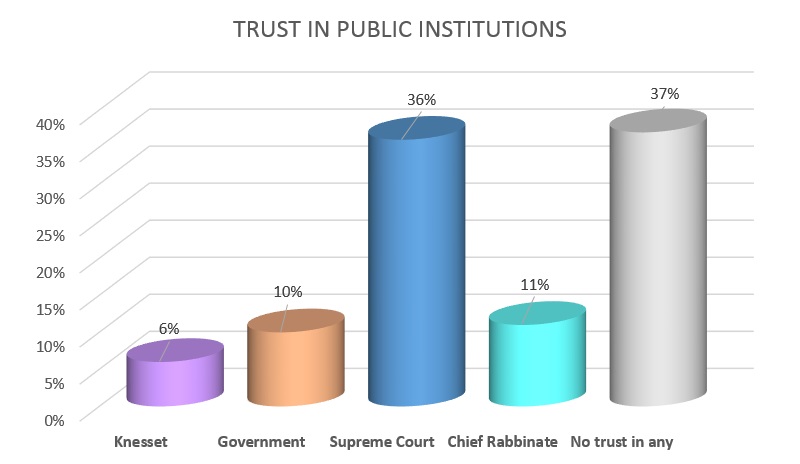
In light of the escalating assault against the Supreme Court emanating from the ultra-Orthodox and Zionist Orthodox parties, as well as other circles on the political right, the Index once again measured which relevant institutions the public holds the highest degree of trust in. Consistently, and repeatedly, the response speaks for itself. While only 6% place their highest trust in the Knesset, 10% in the government, and 11% in the Chief Rabbinate, 36% responded that the Supreme Court is the public institution that they most trust.

A large majority of the adult Jewish population (68%) supports the State of Israel equally recognizing all forms of marriage common in the world, and that alongside Orthodox weddings, a choice will be made possible of civil marriage and Reform/Conservative marriage. Support for freedom of choice in marriage has gradually, but consistently risen since Hiddush started measuring it in 2009 (53% in 2009). It is supported by the majority of voters of all civil coalition parties in the outgoing government, as well as 94% of Blue-&-White voters!
A large majority of the Israeli public wants a Jewish and democratic state, but utterly objects to religious coercion and the ultra-Orthodox parties taking advantage of their swing vote position to dictate their religious demands, which are discriminatory, divisive, and dangerous for the future of the State of Israel and its relations with world Jewry.
We derive great satisfaction from the findings of the Index, which demonstrate that a large majority of the Israeli public wants a Jewish and democratic state, but utterly objects to religious coercion and the ultra-Orthodox parties taking advantage of their swing vote position to dictate their religious demands, which are discriminatory, divisive, and dangerous for the future of the State of Israel and its relations with world Jewry. It is evident that the findings of the 2019 Index provide a constructive basis for Jewish Diaspora leadership’s stepping up their engagement, in partnership with Israeli organizations and activists, aimed at achieving the long overdue change in the Israeli governmental policies, which erode Diaspora Jewry’s bonds with Israel and undermine the essential interests of the State of Israel and Jewish people.
The overwhelming majority of the Jewish population in Israel supports the full implementation of Israel’s Declaration of Independence for freedom of religion and conscience and for equality, regardless of religion. Anyone who studies who studies Hiddush’s Israel Religion & State Indices and the surveys that it has conducted this year since January will better understand the moves made during the recent election campaign in relation to religion and state. Hiddush is the only NGO, which pointed to this a long while before Yisrael Beiteinu’s leader Avigdor Lieberman decided to focus on them, and subsequently the Blue-&-White party led by Benny Gantz. It is important for the Likud to realize that the majority of its voters support a change in policy and cessation of surrender to the ultra-Orthodox parties. Further, Blue-&-White must recognize that giving in to continued religious coercion, which is euphemistically called the ‘status quo’ would be a naked betrayal of its voters and an accommodation of a severe harm to Israel and the Jewish people.
As the New Hebrew Year begins so too does a new chapter in the unfolding story of Israeli politics. We hope that the country’s leaders will embrace the need for a new path which is in line with the state’s identity and its partnership with the pluralistic Diaspora Jewish community, will uphold civil liberties and human dignity, will celebrate the principle of religious freedom, the rule of law, and respect for the independence and authority of the civil judiciary.
The Israel Religion & State Index Survey was conducted by the Smith Institute in August 2019 on the basis of an expanded sample of 753 people representing the adult Jewish population in Israel, aged 18 and over. Sampling error ±3.6%. The supplementary survey was conducted on September 22-23 by the Smith Institute on the basis of a representative sample of 600 men and women, representing the adult Jewish population in Israel (margin of error ±4%).
Additional Key Findings
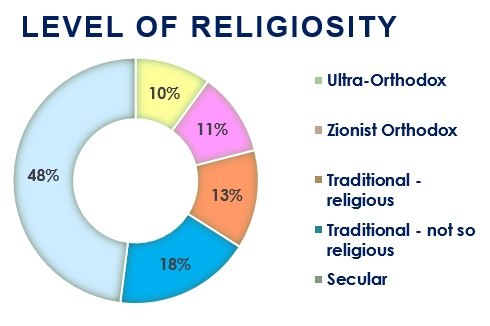
- The break-down of Israel’s Jewish adult population, according to level of religiosity: ultra-Orthodox – 10%, Zionist Orthodox – 11%, Traditional-religious – 13%, Traditional-not so religious – 18%, Secular – 48%.

- With which streams of Judaism does the public associate? Ultra-Orthodox – 10%, Zionist ultra-Orthodox – 2%, Zionist Orthodox – 18%, Conservative – 6%, Reform – 7%, does not affiliate with any – 57%.
- 72% view the tension in Israeli society between secular and ultra-Orthodox as the harshest domestic tension (or the second harshest), more acute than the tension between political left and right (70%) and more than 4x more acute than the tensions between Sephardic and Ashkenazic Jews and between the rich and the poor.
- 84% support freedom of religion and conscience. 57% support separation of religion and state.
- 74% are dissatisfied with the actions of the government on matters of religion-state.
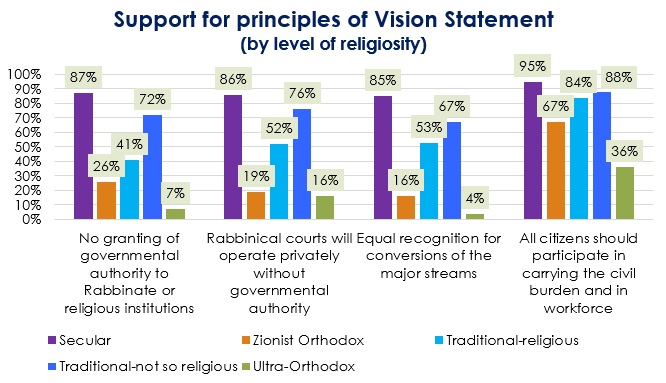
- 64% support the suggestion by the Vision Statement for Israel as a Jewish and democratic state, according to which the state should not transfer governmental authority to any religious institutions, whether on the national level (example: Chief Rabbinate) or on the local level (example: city rabbis), so that the public will not be subject to any religious establishment acting on behalf of the state.
- 66% support the suggestion by the Vision Statement for Israel as a Jewish and democratic state, according to which the state should not transfer governmental authority, and will not fund the work of the religious courts; parties that may want to have their disputes adjudicated according to religious laws will be free to do so privately and on a voluntary basis, without state intervention.
- 62% support the suggestion by the Vision Statement for Israel as a Jewish and democratic state, according to which whoever wants to join the Jewish people via conversion may do so through rabbis ordained by the different streams that are active among the Jewish people, including Modern Orthodoxy and the non-Orthodox, with the State of Israel equally recognizing these conversions, but without requiring other religious groups to recognize these conversions.
- 84% support the suggestion by the Vision Statement for Israel as a Jewish and democratic state, according to which Israel should insist that all its citizens meet their civil obligations and participate fairly and equitably in carrying the military/civilian service burden and participate in the workforce.
- 79% of the adult Jewish population maintains that core curricular studies should be enforced in state-funded ultra-Orthodox schools. This is supported by the voters of all parties other than the ultra-Orthodox parties. 78% of Likud voters support this, as does a higher percentage of voters for the other parties, such as Blue-&-White (95%).
- Only a small minority (11%) agree with rabbis and other proponents of conversion therapy for homosexuals, and as to whether those who support it should allowed to serve in government positions, such as Minister of Education, 67% view them as unfit.